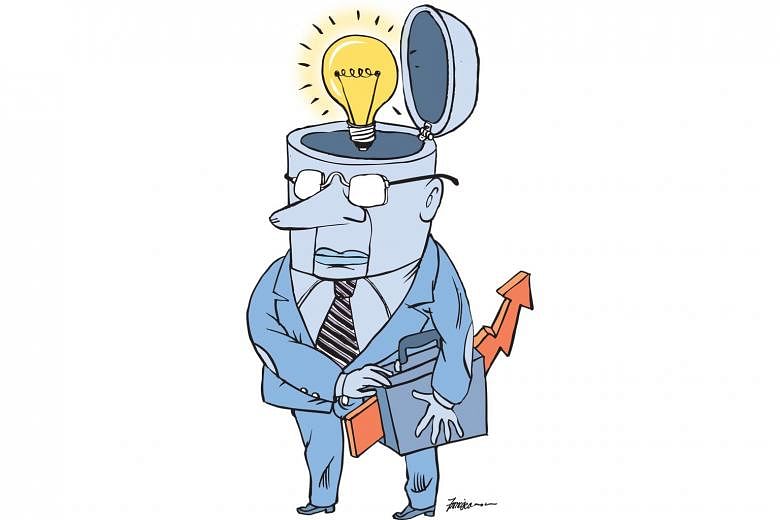For many, the phrase "intellectual property" (IP) would probably bring to mind one of those ads we have been subjected to over the years each time we went to the cinema, about the horrors of film piracy.
Or perhaps one might recall any of several high-profile cases in which a giant corporation or famous artist managed to claim ownership over a pretty basic idea.
Like when Apple successfully obtained a patent so that nobody can ever make a product that is rectangular with rounded corners, or when Taylor Swift trademarked phrases such as "Nice to meet you, where you been?" from her song lyrics.
That's right. Swift could sue you if you use the phrase "This sick beat" in a song, poster or even on a removable tattoo, without her permission.
In short, IP can seem like scary stuff to mess with, the domain of multinationals, megastars and people with expensive law degrees.
But the Singapore Government would like you to know this: IP has a very benign side to it too. In fact, it would really like it if we got to know IP a little bit better.

"We have to stop seeing IP as a technical, legal thing that scares off anyone who's not a lawyer and who's not steeped in the technical IP world," Mr Daren Tang, the chief executive of the Intellectual Property Office of Singapore (Ipos), said at a media briefing two weeks ago.
"We have to make sure that people understand IP is of strategic importance to their business. We want business owners to be comfortable with IP."
He was speaking at an event to announce a whole new phase in Singapore's IP journey, one that includes the launch of a $1 billion Makara Innovation Fund, to invest in innovative companies with globally competitive IP.
As he pointed out, IP's role in the global economy is becoming more significant as, increasingly, the most innovative companies of the day are those that trade not in goods but in services, ideas, technology and data.
Kodak is out, Instagram is in.
The world's largest taxi company, Uber, does not own a single vehicle.
Singapore's own Razer, valued at US$1.5 billion (S$2.1 billion), sells computer gaming hardware, yet owns no land, factories or inventory.
What it does have, as Mr Tang noted at the briefing, is a portfolio of over 1,000 IPs - trademarks, designs and patents. "Razer is using IP not just to protect, enforce and ringfence, but to grow, acquire and become bigger," he said.
And as Singapore heads into the future, more companies have to do the same.
This was highlighted in February by the Committee on the Future Economy (CFE), which noted in its report that economies that create, preserve and disseminate IP well are the ones that will turn out to be innovative and competitive.
IP: BREAKING IT DOWN
One of the big myths about IP is that it is created only within disruptive start-ups or huge multinationals with deep research and development (R&D) pockets.
Not so.
And many companies, especially small and medium-sized enterprises (SMEs), do not know that they may be sitting on intangible assets of their own, much less that these could be their IP, off which they could make money.
Mr Paul Adams, the chief executive of intangible asset specialist EverEdge Global, said he recently dealt with a company that had been around for 30 years and was in the process of being sold.
The business owners had been advised by other consultants that the company would likely garner a sale price amounting to about four times its operating profit.
"But when we looked at their business, we realised that there was a very valuable asset that nobody had realised was there - the data," Mr Adams said.
Over the past 30 years the company had collected a lot of data related to its particular area of business. "So we helped to run that sales process, focusing on the value of the data, and we targeted buyers that might not be interested in buying the company per se but who would really want that data, and we ended up selling that business for 32 times operating profit."
Other companies may be fully aware of the assets in their hands, but face different stumbling blocks.
"It's one thing to come up with an idea, it's quite another to turn that into a successful, growing business," Mr Adams noted.
"So what you find a lot of the time is that, for example, people will come up with a great idea for a product or service and they will charge out into the market without thinking, 'What's the best way of protecting this? If we deploy this in the market, how do we ensure that people don't simply copy it?'"
Others might charge into a new geographical market without checking to see whether there are any IP risks - does their product or service infringe on the IP of a company already in that market, for example?
IP: GAPS IN ECOSYSTEM AND A THREE-PRONGED SOLUTION
These problems reflect some of the gaps in Singapore's IP ecosystem.
Mr Tang describes the healthy IP life cycle within a company or a nation thus: They have ideas that they research which become IP, that become products and services that go out to market, generating revenue, which then goes back into R&D reinvestment.
"Singapore has done well in the top half of this cycle - we have built a great R&D ecosystem in the last 20 years and we are the top-ranked IP regime in Asia but what we need to focus on going ahead is the latter part of the cycle, dealing with IP commercialisation," he noted.
"How do we translate all this IP into things that can go out to the market and create companies, create jobs and drive the economy?"
The solution, he said, is three-pronged:
• Build a pipeline of IP experts with an understanding of law, technology and business, who can help companies unlock their intangible assets and get the right IP strategy in place,
• Change the general mindset towards IP - it is not just a legal right that should be enforced and respected, but also a business strategy, and
• Bring together financiers, IP professionals, lawyers and other experts to create that flow in the innovation cycle.
Ipos' big event two weeks ago laid out how it is taking some of the first steps towards this vision.
It announced, for example, that Ipos and the Ministry of Law have updated the IP Hub Master Plan. It aims to double the number of skilled IP experts in Singapore to 1,000 and train more working professionals in IP-related issues, so they can help their companies on this matter.
IP ValueLab, the enterprise- engagement arm of Ipos, has begun collaborating with EverEdge, aiming to reach out to more than 150 local companies over the next three years to provide intensive and customised assistance on such issues - IP strategy, management and commercialisation - and help them with their long-term expansion plans.
Meanwhile, the $1 billion Makara Innovation Fund, a partnership between Ipos and home-grown private equity firm Makara Capital, marries Ipos' expertise in IP with that of private equity specialists, to source companies that have strong intellectual property internationally.
The fund will invest $30 million to $150 million each in 10 to 15 young companies that have high-growth potential and own globally competitive technologies, helping them use Singapore as a launchpad from which to grow regionally.
More initiatives will follow.
In its February report, the CFE recommended, for example, developing a standardised IP protocol for all public agencies and publicly-funded research performers, to simplify the commercialisation process.
This is in the works, Mr Tang said.
So the time is ripe for Singaporeans to get over the simplistic understanding of IP as something only to be concerned about if you are watching a pirated film. If these moves are any indication, it may not be too long before IP becomes the next hot trend to jump on.
Take a quiz to find out how much you know about intellectual property. http://str.sg/IPquiz



